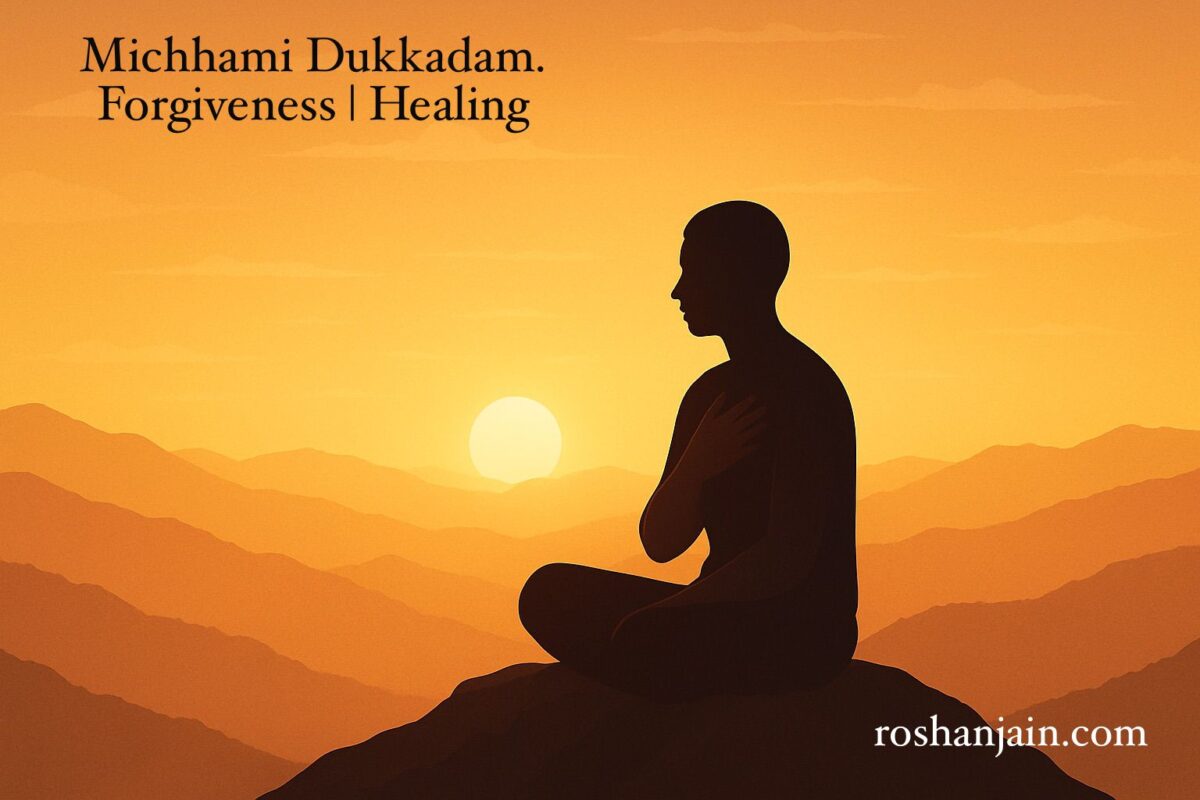In Jainism, forgiveness (kshama) is not a one-sided concept. It is both the humility to seek forgiveness and the courage to forgive others. This dual practice dissolves resentment, softens the ego, and restores harmony within relationships and within the self.
“Khama veeryasya bhūṣaṇam” — Forgiveness is the ornament of the brave. – Bhagwan Mahaveer
This reflects Mahaveer’s teaching that true strength lies not in retaliation, but in the ability to forgive with compassion and humility.
Every year, Jains across the world fold their hands and say: “Michhami Dukkadam” — “If I have hurt you, knowingly or unknowingly, I seek your forgiveness.”
This timeless practice is more than ritual. It is an emotional cleanse, a conscious release of ego, and an opening of the heart. By asking for forgiveness, we heal our relationships, and in the same act, we heal ourselves.
Forgiveness, whether sought or given, is not about fault-finding. It is about fault-releasing. It is not weakness but humanness. And when practised sincerely, it becomes a profound inner freedom.
What Forgiveness Really Means
“The weak can never forgive. Forgiveness is the attribute of the strong.” — Mahatma Gandhi
Forgiveness is often misunderstood. Many believe it means condoning harm or erasing the past. In truth, forgiveness is a deeply personal journey—a quiet rebellion against the emotional baggage that weighs us down.
Forgiveness doesn’t begin with forgetting. It begins with remembering without a trace of bleeding. It is not a favour to another person; it is a radical act of self-love. By forgiving, we choose to no longer carry the poison of resentment.
When we forgive, we step out of the shadow of another’s actions and reclaim the light of our own peace. For peace was never theirs to give—it was always yours to reclaim.
Self-Forgiveness — The Hardest Yet Most Sacred
“We cannot change anything until we accept it. Condemnation does not liberate, it oppresses.” — Carl Jung
If forgiving others is difficult, forgiving ourselves is often the hardest of all. We replay our mistakes like echoes in the mind, punishing ourselves long after the world has moved on. Yet, self-forgiveness is not about denying our flaws or rewriting the past. It is about looking in the mirror and whispering: “I stumbled, I erred, but I am still worthy of love.”
True self-forgiveness does not erase the past; it redeems it. Our mistakes become teachers, our regrets turn into wisdom. To withhold this grace from ourselves is to live in chains we forged with our own hands. Would you deny a dear friend the compassion you refuse to give yourself?
The journey of forgiving oneself is not an endpoint but a gentle homecoming—to acceptance, to inner peace, to the heart. In that space, healing begins.
Just as we learn to offer compassion inward, we must also remember that forgiveness is not blind surrender. To forgive wisely is to pair softness with strength.
Forgiveness with Boundaries — Letting Go Without Losing Yourself
“Love yourself enough to set boundaries. Your time and energy are precious.” — Brené Brown
Forgiveness does not mean reconciliation. You can forgive someone and still protect your peace.
Forgiveness releases the anger. Boundaries ensure it doesn’t return.
You can be compassionate and still say: “You may not hurt me again.” Forgiveness softens your heart, while boundaries strengthen your spirit. Together, they protect your dignity and restore your wholeness.
Forgive, But Don’t Forget — Remembering with Grace
“Holding onto anger is like drinking poison and expecting the other person to die.” — Buddha
“Forgive and forget” is a common phrase. But forgetting is not healing—it is amnesia of the soul.
Forgiveness does not erase memories. It transforms them. You remember without bitterness, carry lessons instead of wounds, and choose to no longer let the past dictate your present.
Your memories can become monuments of strength, not prisons of pain.
Forgiveness is Freedom
“To forgive is to set a prisoner free and discover that the prisoner was you.” — Lewis B. Smedes
Ultimately, forgiveness is not about them. It’s about you. It’s about choosing freedom over chains, peace over pride, growth over grudges.
Whether it’s forgiving others, forgiving yourself, or asking for forgiveness—every act of letting go is an act of reclaiming your emotional freedom.
And sometimes, it begins with the simplest of words: “Michhami Dukkadam.”
Conclusion
Modern psychology echoes what ancient wisdom has long taught: forgiveness is medicine for the mind. Holding onto grudges traps us in cycles of stress, anxiety, and depression. Letting go is not about excusing others, but about freeing ourselves from emotional captivity. When we forgive both others and ourselves, we reduce our burden, improve our resilience, and cultivate emotional balance. Forgiveness, then, is not just a spiritual virtue but a mental health necessity.
_________
5 Must-Read Books on Forgiveness
- The Book of Forgiving — Desmond Tutu & Mpho Tutu
- Forgive for Good — Dr. Fred Luskin
- The Power of Forgiveness — Everett Worthington Jr.
- Radical Forgiveness — Colin Tipping
- How Can I Forgive You? — Janis Abrahms Spring
________
About the Author
Dr. Roshan Jain is a psychiatrist, educator, and mental health advocate committed to mindful, ethical, and empowering approaches to emotional well-being. He shares insights across multiple platforms to make mental health knowledge accessible and practical for all:
- ️ Podcast: Mind Matters– conversations on wellbeing, mindfulness, and mental health awareness.
- Instagram: @_mindsense – daily tips, reflections, quotes, and mental health education.
- ✍️ MindBlog: roshanjain.com – in-depth articles on mental health and emotional wellness.
- YouTube: Mindism – awareness talks, guided reflections, and informative videos.
Through these platforms, Dr. Jain continues his mission of breaking down stigma, encouraging open conversations, and guiding people toward a mindful life. You can also connect with him on LinkedIn: linkedin.com/in/roshanjaindr


